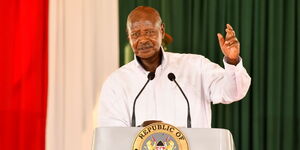The International Monetary Fund (IMF), on Monday, January 5, offered President William Ruto’s government support in raising a diaspora bond.
IMF's gesture came a day after Prime Cabinet Secretary Musalia Mudavadi announced that the Kenya Kwanza administration would float a bond targeting Kenyans living abroad through the World Bank’s Multilateral Investment Guarantee Agency (MIGA) and the National Treasury.
A diaspora bond is a model used by developing countries to raise money through issuing fixed-income investment loans to their expatriates.
IMF African Department Director Abebe Aemro remarked that the bond would ease financial constraints currently bedevilling Kenya.
Abebe was answering a question raised by journalist Julians Amboko on whether Kenya was ready to return to the international bond market.
“In due course, Kenya will be able to return to markets and I hope that conditions will have eased so that this can be sooner rather than later,” he remarked.
“This includes, of course, trying new instruments like perhaps the diaspora bond that Kenya’s government has been talking about. I think we are hopeful that Kenya's progress will continue.”
Additionally, the IMF African Department Director was full of praise for the reforms undertaken by Ruto’s government to stabilise Kenya’s debt.
“We see in Kenya very solid and very strong effort having been made to make sure that macroeconomic imbalances are contained,” Abebe remarked.
He pointed out fiscal reforms undertaken by the National Treasury and the Central Bank of Kenya to stabilise and reduce debt.
Mudavadi while announcing the bond stated that it would offer better returns than interest rates in the source markets for diaspora remittances.
“The bond will enable the Government to diversify its public debt mix, reducing our exposure to costly commercial debt,” he added.
Kenya joins India and Israel as some of the top countries depending on their expatriates to raise cash for development projects through diaspora bonds.












